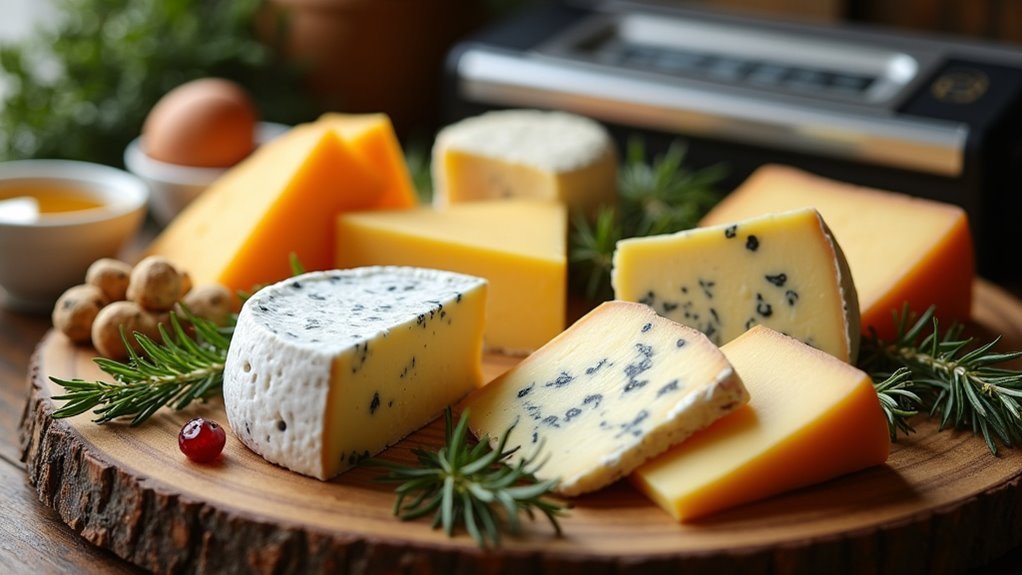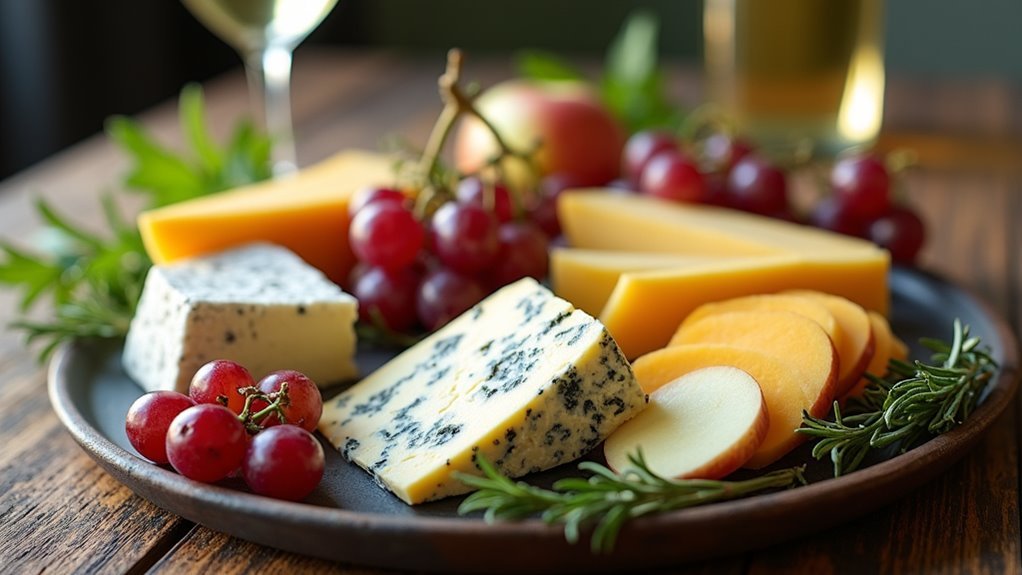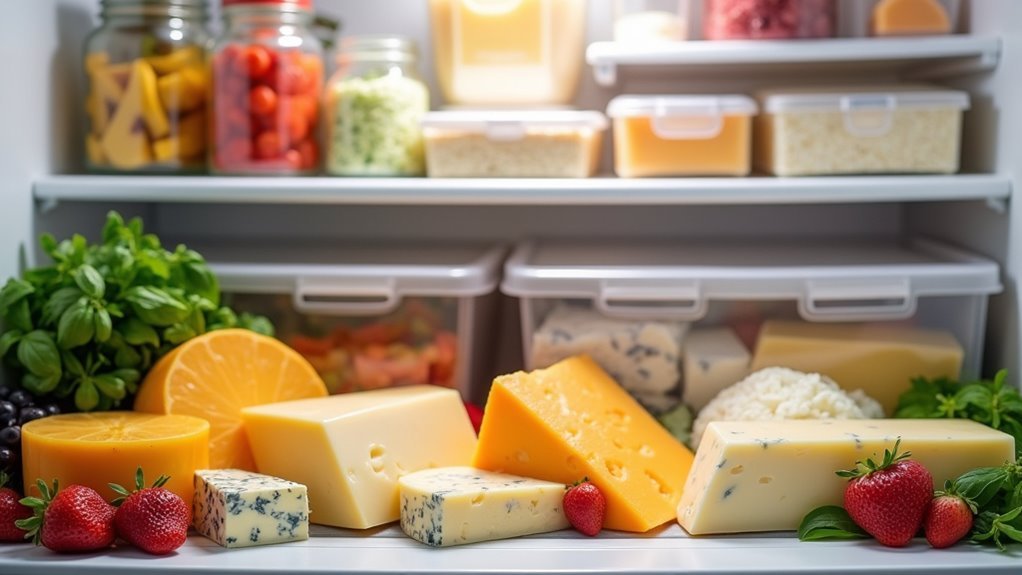When we vacuum seal cheese, we’re creating an airtight barrier that dramatically extends its shelf life by 2-4 times while preventing mold growth and bacterial contamination. This process removes oxygen that promotes spoilage, maintains the cheese’s natural moisture balance, and preserves those complex flavors we love in artisanal varieties. Whether it’s hard cheddar or specialty cheese, vacuum sealing prevents cross-contamination with other food odors and keeps texture perfectly intact. There’s much more to mastering this preservation technique.
How Vacuum Sealing Extends Cheese Shelf Life

When we’re looking for ways to keep our favorite cheeses fresh and delicious for as long as possible, vacuum sealing emerges as one of the most effective preservation methods available. This innovative vacuum sealing method removes air from a package, dramatically reducing mold growth and extending shelf life by 2-4 times compared to traditional storage.
The magic happens when we vacuum seal cheese by controlling moisture in the cheese and slowing the aging process. Hard cheeses particularly benefit from this technique, as do different types of specialty varieties. Additionally, proper management of air exposure is crucial for maintaining both flavor and texture, further enhancing the quality of vacuum-sealed cheese.
By creating an airtight environment, each vacuum sealed cheese maintains its unique characteristics while preventing spoilage.
Cheese makers and home enthusiasts alike appreciate how this method reduces food waste, keeping our beloved dairy treasures fresh for months longer than conventional storage allows.
Preventing Mold Growth and Bacterial Contamination
Although many of us have experienced the disappointment of discovering fuzzy mold spots on our expensive cheese, vacuum sealing offers a powerful solution that tackles this problem at its source. When we use vacuum sealers to remove air from cheese packaging, we’re fundamentally starving harmful microorganisms of the oxygen they need to thrive.
| Without Vacuum Sealing | With Vacuum Sealing |
|---|---|
| Oxygen promotes mold growth | Limited oxygen inhibits spoilage bacteria |
| Frequent bacterial contamination | Airtight environment prevents contamination |
| Higher food waste | Extended shelf life reduces waste |
| Inconsistent moisture levels | Maintained moisture prevents drying |
This airtight environment dramatically extends our vacuum-sealed cheese’s shelf life while maintaining ideal moisture levels, keeping our favorite varieties fresh and delicious for much longer. However, it’s essential to be cautious, as certain foods can promote harmful bacterial growth if improperly sealed.
Maintaining Moisture Balance and Texture Quality

Since texture makes all the difference between cheese that melts beautifully on our tongues and cheese that feels like cardboard, we’ll want to master the art of maintaining perfect moisture balance through vacuum sealing.
Vacuum packaging creates an airtight environment that preserves cheese’s natural moisture content, preventing that dreaded dry, crumbly texture we all hate.
We’ll wrap our cheese in wax paper before vacuum sealing to retain ideal moisture during storage. This technique prevents excess moisture that leads to mold growth while keeping desirable fats that create creaminess.
Hard cheeses last longer than soft cheeses due to lower moisture content, but both benefit from proper vacuum sealing. Vacuum sealing preserves freshness and quality, ensuring we maintain that perfect texture.
Monitoring humidity levels during cheese aging ensures we strike that perfect balance between moist and moldy.
Protecting Flavor Integrity During Storage
While texture certainly matters, nothing beats the disappointment of opening perfectly stored cheese only to discover its flavors have gone flat or picked up unwanted tastes from the fridge.
Vacuum sealing creates an airtight barrier that protects your cheeses’ flavor integrity by eliminating air exposure, which causes off-flavors and spoilage.
Here’s how vacuum sealing preserves those delicious tastes we’re after:
- Prevents cross-contamination – Each cheese maintains its unique flavor profile without absorbing other food odors.
- Blocks harmful bacteria and molds – The sealed environment stops microorganisms that compromise taste.
- Extends shelf life considerably – Your artisanal cheeses retain their complex flavors much longer, adding significant benefits to your overall food preservation efforts.
Optimizing Refrigerator and Freezer Storage Conditions

Now that we’ve protected our cheese’s amazing flavors through vacuum sealing, we need to find the perfect spot in our kitchen to keep them safe and delicious. When you store vacuum-sealed cheese, location matters tremendously for maintaining ideal quality.
| Storage Area | Temperature | Best For |
|---|---|---|
| Main Fridge Body | 35-45°F | Daily use cheese |
| Fridge Door | Avoid | Temperature fluctuations |
| Freezer | 0°F | Long-term storage |
| Counter | Never | Spoilage risk |
We’ll maintain consistent cooling by keeping our vacuum seal your cheese in the main refrigerator body, avoiding those pesky temperature fluctuations from door openings. For successful cheese vacuum storage, we’re labeling each package with type and date. Freezer storage helps cheese last longer—up to 8-9 months—while avoiding flavor transfer between different varieties. Additionally, storing vacuum-sealed cheese not only helps preserve its taste but also reduces food waste, allowing you to enjoy it for longer.
Frequently Asked Questions
How Long Does Vacuum Wrapped Cheese Last?
Despite concerns about complicated storage, we’ve found vacuum wrapped cheese lasts 2-4 weeks refrigerated and 4-6 months frozen. Vacuum longevity depends on cheese varieties – hard cheeses like Parmesan benefit most from these packaging benefits.
Can You Vacuum Seal Cheese for Aging?
We can vacuum seal cheese for aging, though it requires careful monitoring of moisture retention and bacterial growth. Proper storage conditions and specialized films help maintain the ripening process while preserving texture.
What Is the Point of Vacuum Sealing Food?
Think of vacuum sealing as putting food in suspended animation. We’re achieving food preservation, freshness maintenance, and mold prevention while extending shelf life. It’s our storage efficiency superhero, delivering convenience factor and waste reduction.
Can You Freeze Cheese if It’s Vacuum Sealed?
We can freeze vacuum-sealed cheese using proper freezing techniques for cheese preservation. Vacuum benefits include moisture control and seal effectiveness, extending storage duration while maintaining flavor retention, though cheese texture varies among cheese varieties during the thawing process.
